Ford’s new Mustang is HOT and Vaterra’s version is spot on!
Words: Mark Houlahan
Photos: Walter Sidas
This article was originally published in RC Driver’s April 2015 issue.
When Horizon Hobby first launched its Vaterra product line of realistic, scale, licensed cars they hit the ground running with a garage full of imports and first-gen Camaros. For those of the Blue Oval persuasion there wasn’t much to get excited about; and then—BAM—Vaterra knocks one clear out of the park with their ’67 Mustang fastback early last year. A car you could just stare at for hours and admire every angle, curve, and feature of the licensed Mustang body. We know; we’ve done just that! Well folks, Vaterra has done it again! Using its tried and true V100-S touring car chassis, Vaterra has swung for the fences again with its new 2015 Mustang GT, coincidentally released at the same time as the real deal.
AT A GLANCE
WHO MAKES IT: Vaterra by Horizon Hobby
WHO IT’S FOR: Beginning RC and scale enthusiasts
PART NUMBER: VTR03024
HOW MUCH: $289.99 BUILD TYPE: RTR
PROS
• Exacting scale looks, proportions and features
• Waterproof electronics
• Easy pivot battery hold-down
• Driveline sits on a full set of ball bearings
• All batteries and a 2 amp charger included
CONS
• Hollow friction-type shocks
• Tires can rub the body at certain steering angles/suspension compression
REVIEWER’S OPINION
Vaterra has a plan and it works. Take a decent chassis with a nice range of available upgrades and stick ultra-realistic licensed scale bodies on it for those enthusiasts wanting something that matches the car in their garage or the dream ride in their head. First it was imports, then Camaros and Corvettes. Now we have two different Mustangs that bookend 50 years of Mustang production. The Vaterra V100-S is a durable and fun platform no matter what body is on it and makes for a great first hobby grade RC car.
TOOLS AND ACCESSORIES INCLUDED
• 4-way wrench
• Allen wrenches
• 2 amp A/C peak detection charger
• 1,800mAh NiMH 6-cell battery with
EC3 connector
4 “AA” batteries for transmitter
Bind plug
HOP-UPS WE RECOMMEND
• VTR3330001 Aluminum Oil Filled Shock Set As we said in our review, the friction shocks weren’t the worst things we’ve ever driven on, and surprisingly felt fairly smooth in our hands-on “right out of the box” touchy- feely inspection. But there’s that bit of nagging in the back of our head that tells us this upgraded shock set will turn us into Dario Franchitti behind the controller.
• VTR332003 Aluminum Center Driveshaft Even with a brushed system I install an aluminum driveshaft in all my shaft-driven touring cars. The aluminum shaft is lighter and stronger, putting more power to the tires while saving weight, and adds a bit of flair to the otherwise all black plastic chassis.
• DYN9005EC Reaction 7.4V 5000mAh
2S 30C LiPo Hard Case: EC3
The included 1,800mAh NiMH battery is a great start and most likely fine for the casual RC enthusiast that is going to pull this car out of the trunk of their 2015 Mustang at a car show. However, a simple upgrade to the Dynamite 2S 5,000mAh LiPo means longer run times and more power to the factory motor.
FEATURE BREAKDOWN
The V100-S chassis is the mainstay of all of Vaterra’s licensed on-road cars. The chassis is an injection-molded composite that is very stiff. On the bottom you’ll find a smooth deck with countersunk screws and a series of X-bracing down the middle tunnel. Topside, the chassis features composite shock towers/bulkheads and a bolt-in brace running the length of the chassis just above the center driveshaft. This bolt-in brace allows easy access for drivetrain maintenance, yet prevents fore- to-aft chassis flexing. It is a simple, yet effective design you can easily see in action by attempting to wiggle the brace when pressure is applied to the chassis.
Like all of the Vaterra V100-S offerings before it, the 2015 Mustang GT Coupe is a complete RTR package, including not only transmitter batteries but a 1,800mAh six-cell stick pack and two amp quick charger. Literally everything you need to run is in the box and you could be on the road in less than an hour! While we’re seeing other manufacturers start to include batterie, most still only provide a “wall wart” overnight charger. Kudos to Vaterra for including a quick charger in its line of on-road rides.
The Vaterra electronics package is fairly standard for an entry level on-road car. As a product line of parent company Horizon Hobby, Vaterra hits up Mom and Dad for said electronics. You’ll find a Dynamite brand ESC that is waterproof and capable of handling down to an 8-turn motor. The forward/reverse ESC handles 60 amps of continuous current, up to 3S LiPo, and 9-cell NiMH. The ESC features “Smart Brake”, which forces the user to come to a complete stop and cycle the transmitter back to the neutral position before engaging the opposite direction of travel (no high-speed J-turns, sorry!). Matched to the Dynamite ESC are a Spectrum waterproof receiver, waterproof servo, and a DX2E 2.4GHz transmitter. The receiver is a two-channel DSM Sport while the servo is a digital unit with 65 oz./in. of torque; plenty for steering duties on a touring car. Rounding out the electronics is a 15-turn 540 brushed motor.
Like most entry-level on-road cars the V100-S chassis has mostly fixed suspension points with few adjustments. While this may seem frustrating to someone long in the hobby, we realize these cars end up in the hands of a lot of enthusiasts as their first hobby grade RC car and sometimes not giving them a lot of tuning options is a good thing. We’ve seen way too many people whip out the Allen wrenches or turnbuckle wrench and make their car completely undriveable. That said, the V100-S chassis does allow for small caster changes via shims instead of the caster being built into the uprights. Rear anti-squat is adjusted in a similar manner. The wheelbase is fixed, allowing most any 190mm or 200mm touring car body to be fitted, though off-set wheels may be required for some bodies. The one disappointment in the suspension department, even for an entry-level car, is that Vaterra fit friction shocks to this chassis. They seem to do the job on most surfaces, but the hardcore RC’er in me still feels the chassis should be fitted with proper fluid-filled coilover shocks.
Vaterra’s V100-S chassis features unique differentials branded “VTV” or Viscous Torque Vectoring, and they help channel power to all four wheels for optimum grip in all surface conditions without the detriment and drivetrain stress of lockers. The differentials are completely sealed and can be further tuned using traditional silicone differential fluids to accommodate any surface. That said, they do a darn fine job right out of the box for typical “bashing”.
for in-depth reviews on the latest RC vehicles
Being a scale on-road car, the Vaterra 2015 Mustang is going to see most of its duty as an asphalt stormer, meaning enthusiasts’ driveways, paved street, and parking lots. To that end we loaded up a couple of freshly charged batteries and headed out to a local cruise-in to show off our new ride to some full-scale Mustang owners.
STEERING
The V100-S chassis uses a typical dual bell- crank steering setup. While all plastic, it is quite beefy. The included servo had no trouble transmitting our steering inputs to the front wheels. The linkage showed no slop and the servo saver, while not adjustable, is stiff enough to allow hard cornering at speed and not fold over like a wet noodle. The included S-compound rubber did well on smooth asphalt as well as rougher street pavement.
ACCELERATION/BRAKING
The 15-turn motor and supplied gearing make for a fairly quick package. Today we’re all used to brushless speed with LiPo batteries, so when we grabbed a handful of trigger and saw the Mustang shoot away from us it indeed put a grin on our faces, something we were shocked a brushed/NiMH combination could still do. Braking was on point, with the four wheel drive setup getting us slowed down quickly without any drama or the chassis wanting to swap ends like an older two wheel drive setup. While a function of the speed control, the included “Smart Brake” feature did sadden the car chase fanatic in us, as you can’t immediately go from throttle, to brake, to throttle for exciting J-turns and what not. We’re sure it’s there to protect the electronics and the drivetrain parts, but still, it was a definitely confusing moment when we first ran into the feature—and it can’t be shut off.
HANDLING
Going in we had this huge pre-formed opinion that the V100-S chassis was going to bounce around like a ping pong ball with every little pebble it hit on the road due to the friction shocks. Yes, a lot of RC cars, trucks, and buggies still come with friction shocks (though they usually fit in the palm of your hand) so to see a 1/10-scale on-road car with them was a bit of a letdown. That being said, we were pleasantly surprised at just how tractable and stable the Mustang was. We’re sure a lot of it had to do with the drivetrain and electronics package’s terminal speed of about 23 mph. Drop in a brushless motor and a 2S LiPo pack and double those speeds and we’re sure that ungroomed street surface would wreak a little more havoc, upsetting the chassis. Thankfully, Vaterra does offer a set of oil- filled aluminum shocks for the V100-S chassis and if you’re planning more speed for yours we recommend them.
DURABILITY
This is one aspect of the Vaterra package we felt would come through with flying colors and we were right. Though we didn’t purposely go looking for some high-speed collisions we did break rule number one of the RC hobby—we lost line of sight on our Mustang out in the street and plowed it into tire of a car parked on the street. After prying the blue Mustang from the tire’s death grip we inspected the chassis and the body. Except for a couple of scuffs on the nose of the body, all was as it should be and we were back to expending our battery pack. At the end of our test day we had gone through five NiMH packs and there was no sign of premature wear or slop in any of the suspension or steering, wheel nuts were still tight, and the chassis had minimal scuffs and scrapes (mainly from traveling between the driveway and the street, which were at different heights). We did notice some light rubbing of the front tires at certain steering angles/suspension compression, but nothing that would cause the car to hang up or get completely unsettled.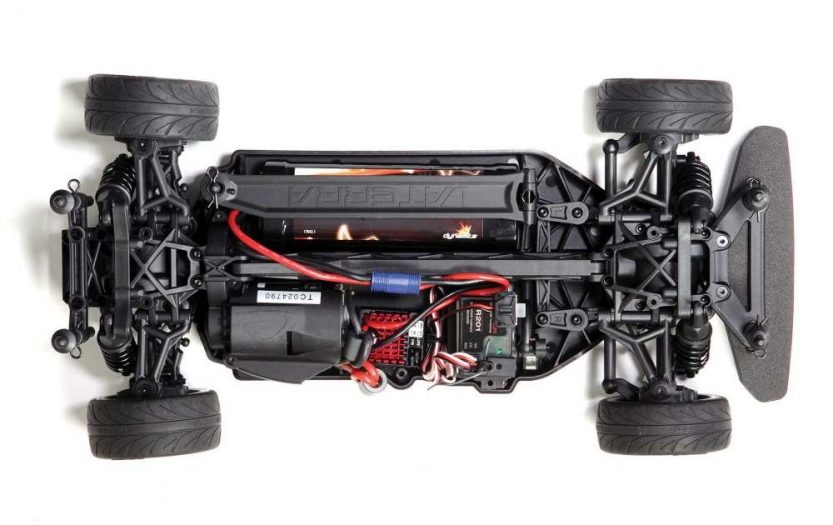
Vaterra’s V100-S chassis uses a simple battery hold down that is secured with a single body clip. The hold down strap simply lifts/pivots out of the way. The strap pivot point and the body clip pin are both height adjustable for taller packs, too.
SPECS AND TUNING OPTIONS
DIMENSIONS
LENGTH: 14.85 in. (371mm)
WIDTH: 7.76 in (194mm) with 30mm Rear tires
WHEELBASE: 10.25 in (256mm)
WEIGHT: 3 lbs. 14 oz.
BODY, WHEELS AND TIRES
BODY: Pre-painted 2015 Ford Mustang GT Coupe in Deep Impact Blue
WHEELS: Volk Racing CE28N matte gunmetal 10-spoke
WHEEL ADAPTER TYPE: 12mm hex
TIRES: 26mm front and 30mm rear V1 Performance S-compound
SUSPENSION
TYPE: 4-wheel independent
CAMBER: Fixed
ROLL: Fixed
WHEELBASE: Fixed
RIDE HEIGHT: Adjustable via shock pre-load clips
MISC: Adjustable caster and anti-squat
STEERING
TYPE: Dual bellcrank
TOE: Fixed
CHASSIS
TYPE: Tub type
MATERIAL: Injection molded composite
THICKNESS: N/A
DRIVETRAIN
TYPE: 4WD
TRANSMISSION: Shaft drive
DIFFERENTIAL: VTV differentials (adjustable via diff oils)
CLUTCH TYPE: N/A
GEAR RATIO: 9.33:1 (22 pinion, 77 spur)
BEARINGS: Full set of shielded bearings
RATING TALLY
Opinion: 8
Performance – Acceleration: 7
Performance – Steering: 7
Performance – Handling: 7
Performance – Durability: 10
Feature Breakdown: 7
Overall Value: 8
WRAP UP
Vaterra has quickly become the “go to” RC line for those looking for the utmost in scale realism, something casual RC enthusiasts and full-scale car owners alike have been looking for. Couple those great scale looks with an extremely durable chassis that can take the bumps and lumps of a new RC driver and a decent selection of upgrades to further enhance their ride, and you have a recipe for success. Throw in waterproof electronics, a true RTR package, and the stability and resources of Horizon Hobby, and you have a winner. It’s not the fastest RC Mustang in my collection, but it’s certainly the one everyone asks about!
LINKS
Vaterra R/C vaterrarc.com, (800) 338-4639
 RC Driver The Best In RC Car & Truck News, Reviews & Video
RC Driver The Best In RC Car & Truck News, Reviews & Video 


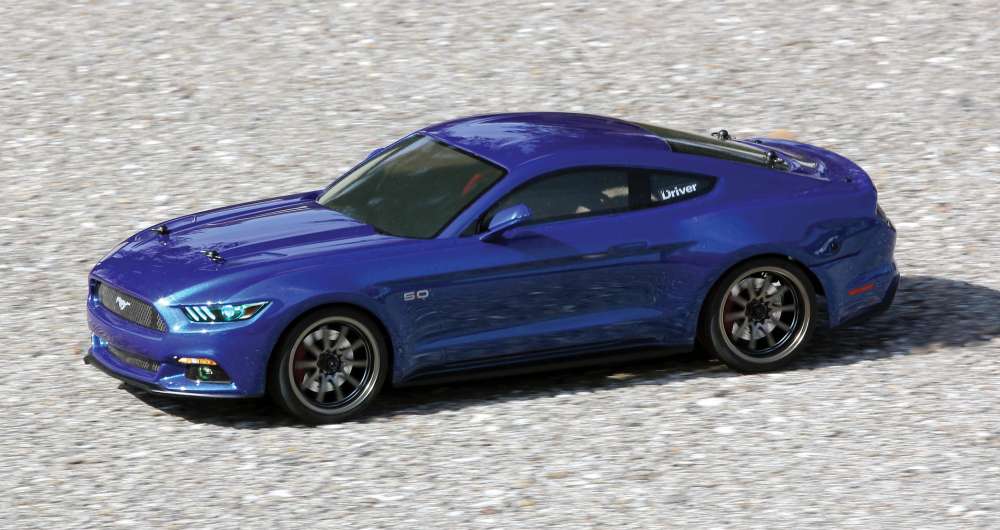
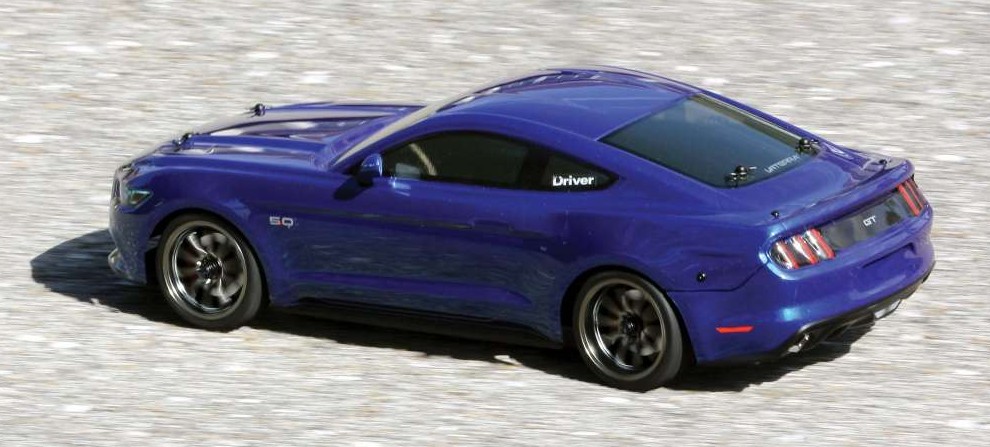
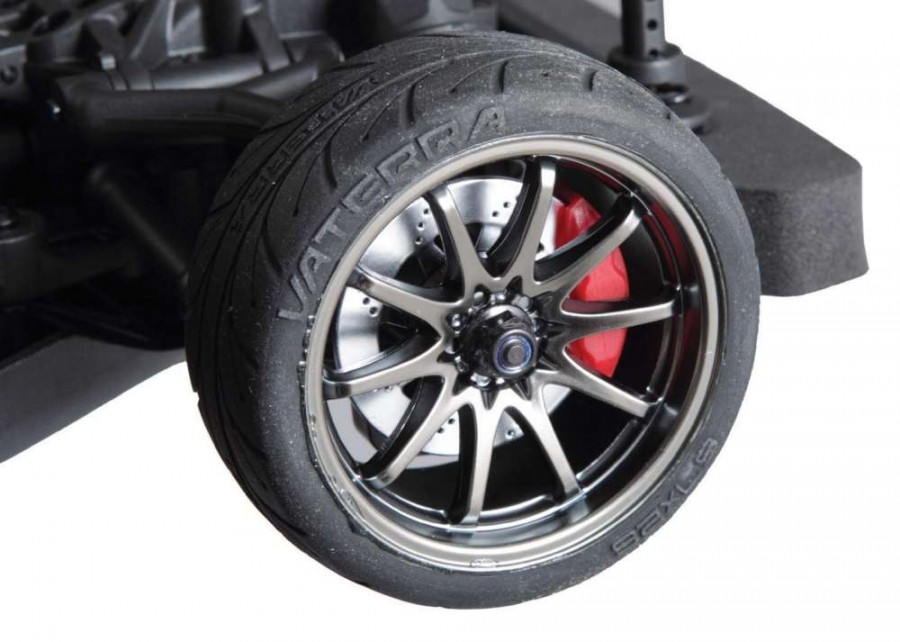
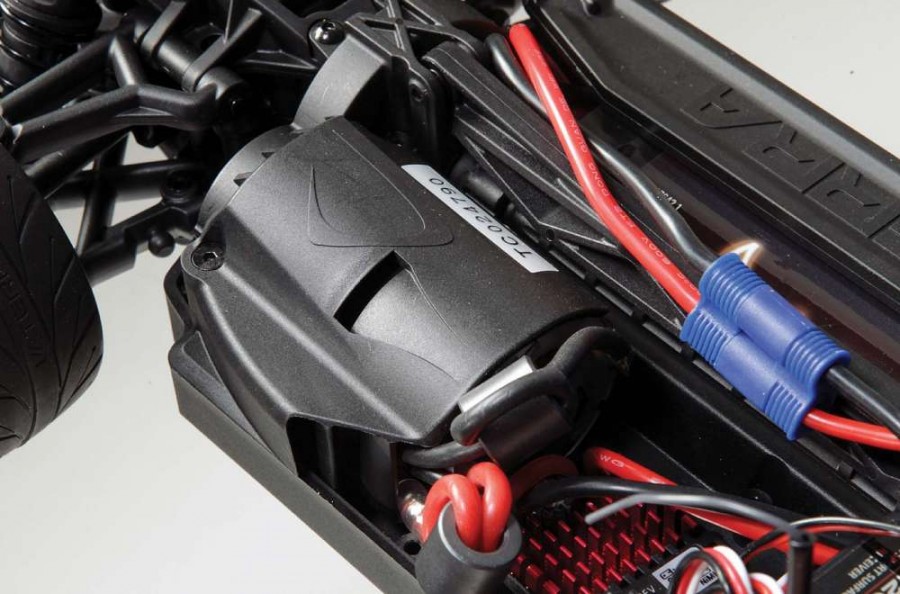
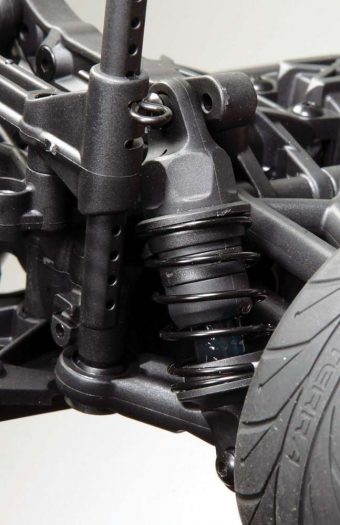
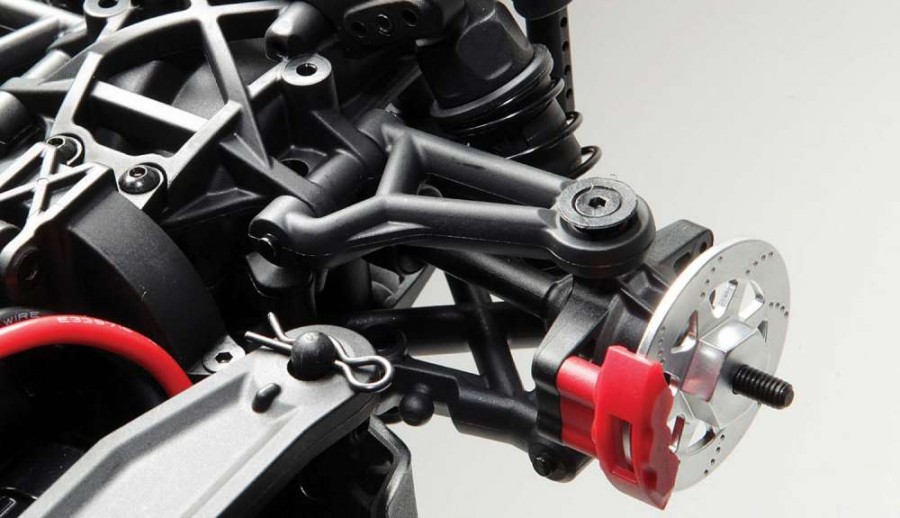






Why do the rear wheels have a, toe in, on the chassis where other manufactures do not?